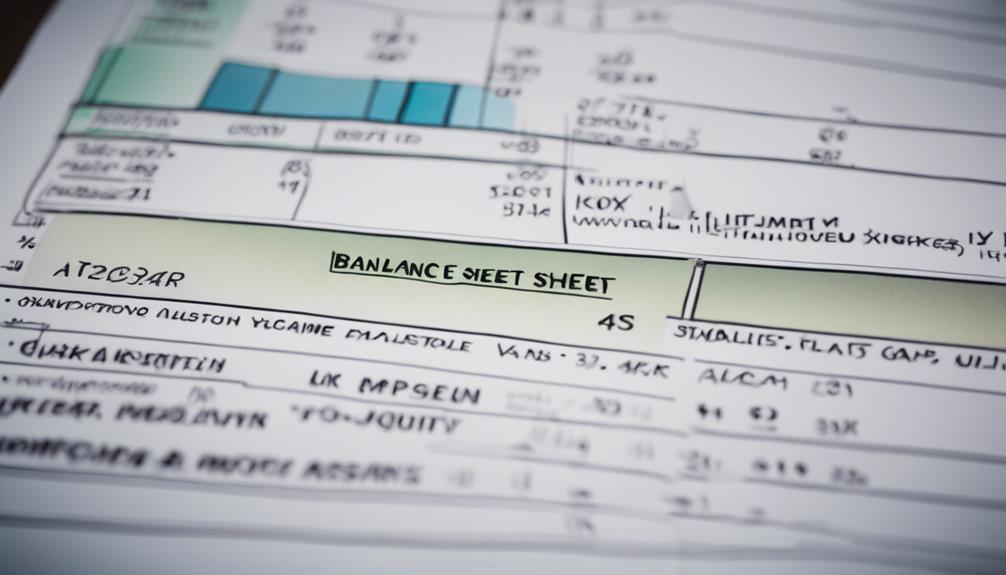You might think that accounting is just about crunching numbers, but there's more to it than meets the eye. Understanding the key components of a strong accounting foundation is crucial for the financial health of any organization.
From accurate financial reporting to strategic decision-making, these elements form the backbone of a successful business. So, what exactly are these components, and how do they contribute to the overall success of your company?
Let's explore the fundamental pillars that support a robust accounting framework and pave the way for sustainable growth and prosperity.
Key Takeaways
- Understanding accounting principles is essential for accurate financial reporting.
- GAAP standards ensure consistent and reliable financial reporting practices.
- Accuracy in bookkeeping is crucial for informed decision-making and compliance.
- Efficient organization of financial information enhances decision-making and sustainability.
Importance of a Solid Accounting Foundation
Having a solid accounting foundation is crucial for businesses to ensure accurate financial reporting and informed decision-making. This foundation serves as the backbone for monitoring financial performance and maintaining compliance with legal requirements. By establishing a strong accounting foundation, businesses can enhance their financial transparency and gain a better understanding of their overall financial health.
Without this foundation, companies may be at risk of facing inaccuracies in their financial reporting, which can hinder long-term planning and strategic decision-making processes. Building a robust accounting foundation involves adhering to fundamental accounting principles and diligently maintaining accurate financial records.
It's through this strong foundation that businesses can effectively track their financial performance, identify areas for improvement, and make sound financial decisions that align with their strategic goals. In essence, a solid accounting foundation is the cornerstone upon which successful financial management and compliance are built.
Understanding Accounting Principles

You should start by grasping the basic accounting principles that serve as the foundation for financial reporting. Understanding the overview of GAAP standards is crucial, especially as they shape financial reporting practices in the U.S.
Recognizing the importance of consistency in applying these principles will ensure accuracy and reliability in financial statements.
Basic Accounting Principles
Understanding basic accounting principles is essential for maintaining accurate and consistent financial reporting. These principles, including the accrual principle, conservatism principle, consistency principle, cost principle, and economic entity principle, guide the recording, reporting, and interpretation of financial transactions in a standardized manner.
By adhering to these principles, you ensure transparency, comparability, and reliability in financial statements, such as the balance sheet. They form the foundation for a strong and reliable accounting system, enabling you to make informed business decisions based on GAAP standards.
Embracing these fundamental principles not only strengthens your financial reporting but also fosters trust and credibility in your organization's financial information.
GAAP Standards Overview
Delving into the realm of accounting standards, the GAAP Standards Overview serves as a crucial framework for ensuring consistency and reliability in financial reporting practices. GAAP, or Generally Accepted Accounting Principles, establishes the rules and guidelines that companies must follow when preparing their financial statements.
These principles promote uniformity in financial reporting, allowing stakeholders to compare financial information accurately across different organizations. The Financial Accounting Standards Board (FASB) is responsible for setting and updating these standards to adapt to the changing business landscape.
Importance of Consistency
Consistency in accounting practices is a cornerstone for ensuring uniformity and reliability in financial reporting across different periods. When you maintain consistency in your accounting methods, you're better equipped to make reliable comparisons and analyze financial trends.
By applying the same principles over time, you ensure that financial statements are prepared using consistent methods and assumptions. This fundamental accounting principle not only fosters transparency but also enhances the credibility and trustworthiness of financial information.
Embracing consistency in your accounting practices is key to building a strong foundation for financial reporting and gaining the confidence of stakeholders in the accuracy and reliability of your financial statements.
Implementing GAAP in Accounting

To effectively implement GAAP in accounting, adherence to the standard framework of Generally Accepted Accounting Principles is crucial for ensuring accurate and transparent financial reporting. GAAP, established by the Financial Accounting Standards Board (FASB), serves as the foundation for financial reporting in the United States. By following GAAP guidelines, companies can maintain consistency, comparability, and transparency in their financial statements. This not only helps in preventing accounting fraud but also enhances credibility and trust among stakeholders.
GAAP-compliant financial statements are especially vital for public companies, as they're required to provide accurate and standardized reports to investors and regulatory bodies. The FASB plays a key role in continuously updating GAAP standards to keep pace with evolving business practices and economic landscapes. Overall, integrating GAAP principles into accounting practices is essential for generating reliable financial information that fosters confidence and accountability in the business world.
Utilizing IFRS for Financial Reporting

Utilizing IFRS standards enhances financial reporting transparency and comparability across global jurisdictions. By adopting IFRS for financial reporting, you ensure consistency and reliability in presenting financial information.
Here are four key benefits of utilizing IFRS:
- Global Consistency: IFRS is used in 167 jurisdictions worldwide, promoting uniformity in financial reporting practices.
- Enhanced Transparency: IFRS standards are designed to improve the clarity and accuracy of financial statements, providing stakeholders with a clear view of a company's financial position.
- Improved Comparability: Through standardized reporting practices, IFRS enables easier comparisons between companies, industries, and countries.
- Facilitates Decision-Making: IFRS aims to provide investors and analysts with high-quality financial information, aiding them in making informed decisions regarding investments and partnerships.
The adoption of IFRS not only fosters trust and accountability but also streamlines cross-border transactions and investments by aligning financial reporting practices globally.
Setting Up Effective Bookkeeping Systems

When setting up effective bookkeeping systems, it's crucial to categorize transactions meticulously to ensure accurate financial tracking.
Organized bookkeeping plays a vital role in recording and reconciling financial data promptly.
Implementing either cash or accrual basis can assist in managing cash flow and facilitating financial reporting.
System Organization Tips
For setting up effective bookkeeping systems, categorizing transactions systematically is crucial to ensure accurate tracking and reporting. Here are some system organization tips to help you streamline your bookkeeping processes:
- Implement a structured chart of accounts: Organize financial data systematically for easy management.
- Utilize accounting software: Enhance efficiency and accuracy in your bookkeeping tasks.
- Regularly reconcile accounts: Maintain accuracy and promptly identify any discrepancies.
- Establish clear documentation and filing systems: Ensure easy retrieval of information and create a reliable audit trail.
Importance of Accuracy
To ensure the effectiveness of your bookkeeping systems, maintaining a high level of accuracy in recording financial transactions is paramount.
Accuracy in bookkeeping isn't just about getting the numbers right; it's about ensuring that your financial data is reliable for decision-making. By keeping precise records of income, expenses, assets, and liabilities, you create a strong foundation for analyzing your business's financial health.
Accurate bookkeeping also plays a crucial role in meeting tax obligations and compliance standards. When your financial data is consistently accurate, you can make informed decisions about your business's future, monitor cash flow effectively, and assess performance with confidence.
Prioritizing accuracy in your bookkeeping practices sets the stage for sound financial management and strategic planning.
Tracking Revenue and Expenses Accurately

How can accurate tracking of revenue and expenses enhance a company's financial understanding and performance?
Tracking revenue and expenses accurately is crucial for maintaining the financial health of a company and making informed decisions. Here are four key reasons why precise tracking of these financial aspects is vital:
- Financial Health: Accurate tracking of revenue and expenses provides a clear insight into the company's overall financial well-being.
- Expense Control: Monitoring expenses helps in identifying areas where costs can be reduced, leading to improved profitability.
- Revenue Recognition: Tracking revenue ensures that all income sources are accounted for, giving a complete picture of the company's earnings.
- Decision-Making: Detailed records of revenue sources and expense categories aid in making strategic business decisions based on reliable financial data.
Organizing Financial Information Efficiently

Efficiently organizing financial information is essential for maintaining a clear and structured overview of a company's monetary transactions and resources. Properly categorizing transactions by type, date, and amount is crucial for easy reference and analysis in accounting. Utilizing accounting software can greatly streamline this process, ensuring accuracy and efficiency. Labeling and tagging financial documents facilitates quick retrieval when needed, improving accessibility. Implementing a systematic filing system for invoices, receipts, and financial statements enhances organization and ensures important documents are readily available. Regularly updating and reconciling financial records is key to maintaining the accuracy and timeliness of the information, reflecting the true financial status of the business.
| Benefits of Organizing Financial Information | |
|---|---|
| – Enhanced clarity and structured overview | – Streamlined process with accounting software |
| – Quick retrieval and easy reference | – Improved accuracy and efficiency |
| – Accessibility and organization |
Establishing Regular Bookkeeping Practices

Establishing consistent bookkeeping practices ensures accurate recording of all financial transactions in a timely manner, providing a foundation for monitoring business performance and facilitating decision-making processes. When you implement regular bookkeeping practices in your business, you lay the groundwork for financial success. Here are four key reasons why establishing these practices is essential:
- Financial Decision-Making: By maintaining organized financial records, you gain valuable insights into your business's financial health, enabling informed decision-making.
- Compliance with GAAP: Following Generally Accepted Accounting Principles (GAAP) ensures that your financial statements are accurate and reliable, essential for regulatory compliance.
- Budgeting and Forecasting: Tracking income and expenses diligently through bookkeeping aids in creating realistic budgets and accurate financial forecasts.
- Enhanced Transparency: Implementing regular bookkeeping practices fosters transparency within your business, building trust with stakeholders and investors.
Consistent and meticulous bookkeeping practices not only help you stay on top of your finances but also pave the way for sustainable growth and success.
Leveraging Accounting for Informed Decision-Making

Leveraging accounting data enables businesses to make strategic decisions based on a thorough analysis of financial information, enhancing overall performance and sustainability. By utilizing Generally Accepted Accounting Principles (GAAP) to interpret financial data, companies can make informed decisions that positively impact their operations. Accounting principles provide a framework for understanding revenue, expenses, profits, and cash flow, allowing for a comprehensive evaluation of the business's financial health. Making decisions based on accurate accounting information enhances financial management, leading to improved outcomes and long-term sustainability.
| Accounting Principles | Financial Information | Informed Decision-Making |
|---|---|---|
| GAAP provides guidelines for recording transactions accurately. | Financial statements offer insights into a company's financial health. | Analyzing financial data helps in making strategic choices. |
| Following GAAP ensures consistency and comparability in financial reporting. | Understanding cash flow patterns is crucial for decision-making. | Utilizing financial information leads to informed strategic decisions. |
| GAAP compliance enhances transparency and trust in financial reporting. | Evaluating profitability ratios aids in decision-making processes. | Making informed decisions based on financial data improves business outcomes. |
Frequently Asked Questions
What Are the Basic Foundation of Accounting?
When it comes to the basic foundation of accounting, understanding the principles of double-entry, cash flow, budgeting techniques, and financial statements is essential. These components form the backbone of accurate financial reporting and decision-making.
What Are the 5 Fundamental Elements of Accounting?
When delving into the 5 fundamental elements of accounting, you encounter assets, liabilities, equity, income, and expenses.
These elements are the building blocks that underpin the financial statements through the double-entry system and accrual basis.
Adhering to reporting standards, you'll find assets as resources, liabilities as obligations, equity as ownership stake, and income/expenses as revenue and costs.
Mastering these fundamentals is crucial for a solid accounting foundation.
What Are the 5 Basic Accounting Principles?
When looking at the 5 basic accounting principles, it's essential to understand the double entry system, accrual basis, matching principle, and materiality concept.
These principles form the backbone of accurate financial reporting.
Embracing these fundamentals ensures that your financial statements reflect a true picture of your business's performance and financial health.
What Are the 4 Fundamental Accounting Concepts?
When discussing the 4 fundamental accounting concepts, it's crucial to grasp:
- Accrual accounting
- The double entry system
- Financial statements
- Revenue recognition
These pillars shape how financial transactions are recorded and reported accurately. Understanding these concepts ensures the consistency and transparency of financial statements, aiding in informed decision-making.
Conclusion
Now that you understand the key components of a strong accounting foundation, you're equipped to navigate the complex world of finance with confidence.
By prioritizing accurate bookkeeping, legal compliance, and strategic planning, you can ensure the stability and success of your organization.
Remember, a solid accounting foundation isn't just a necessity but a powerful tool for informed decision-making and seizing valuable opportunities.
Stay vigilant in maintaining these principles to secure a prosperous future for your business.